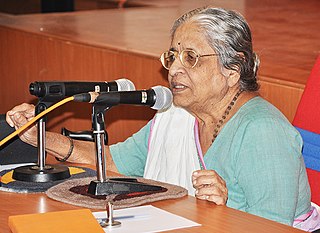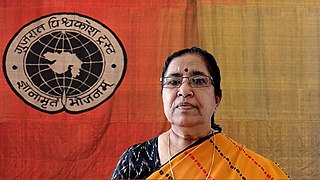
Rajendra Keshavlal Shah was a lyrical poet who wrote in Gujarati. Born in Kapadvanj, he authored more than 20 collections of poems and songs, mainly on the themes of the beauty of nature, and about the everyday lives of indigenous peoples and fisherfolk communities. In his poems using Sanskrit metrics, he was influenced by Rabindranath Tagore. He is considered one of the giants of post Gandhi-era in Gujarati literature.

Gunvant Shah is an essayist, educationist, columnist and philosophy writer and critic from Gujarat, India. He taught at various universities and participated in various education oriented events and organisations. His large number of essays, including philosophical essays, are published as books. He received Ranjitram Suvarna Chandrak in 1997 and Padma Shri, the fourth highest civilian award of India, in 2015. In 2019, he was awarded a D.Lit. by Gujarat University.

Chunilal Madia was a Gujarati author from Gujarat, India, primarily known for his novels and short stories set in rural Saurashtra. Recipients of several awards, he is considered one of the leading writers of Gujarati literature.

Dhirendra Pritamlal Mehta is a Gujarati novelist, poet, critic and editor who received the 2010 Sahitya Akademi Award for Gujarati language for his novel Chhavni.

Dhiruben Gordhanbhai Patel was an Indian novelist, playwright and translator.

Ramesh Parekh (1940-2006) was a Gujarati poet and lyricist from Gujarat, India. He was one of the most popular poets of modern Gujarati poetry. Though government servant by profession, he had deep interest in literature and music. He contributed heavily in field of poetry including geet, ghazal and non-lyrical poetry. He also wrote stories and contributed in Gujarati children's literature.
Manubhai Pancholi also known by his pen name Darshak, was a Gujarati language novelist, author, educationist and politician from Gujarat, India. He participated in the Indian independence movement and held several offices after independence.

Bhagwatikumar Sharma was an Indian author and journalist who wrote in Gujarati. Born in Surat and educated in languages, he edited a daily for several years. He wrote novels, short stories, poetry, essays and criticism. He received Ranjitram Suvarna Chandrak in 1984 and Sahitya Akademi Award in 1988.

Raghuveer Chaudhari is a novelist, poet and critic from Gujarat, India. He has also worked as a columnist for numerous newspapers, such as Sandesh, Janmabhumi, Nirikshaka and Divya Bhaskar. He was a teacher at the Gujarat University until his retirement in 1998. His most significant contributions have been in Gujarati language but he has also written Hindi articles. He received the Sahitya Akademi Award in 1977, for his novel trilogy Uparvas. He received Jnanpith Award, considered to be India's highest literary award, in 2015. In 2019, he was awarded a D.Lit. by Gujarat University.

Labhshankar Jadavji Thakar, also known by his pen names Lagharo and Vaidya Punarvasu, was a Gujarati poet, playwright and story writer from India. Educated in languages and Ayurveda, he taught at colleges before starting practice of Ayurveda. He had a modernist approach in literature and was heavily influenced by absurd theatre and the traditions of experimental literature. He chiefly wrote plays and poetry.

Anila Amrutlal Dalal is a Gujarati critic and translator.

Harshad Trivedi is a Gujarati language poet, short story writer, critic and editor from Gujarat, India. He was an editor of Shabdasrishti, an organ of Gujarat Sahitya Akademi, from 1995 to 2015. Trivedi has served in different positions at several Gujarati literary institutions. As of 2023, he is a president of Gujarati Sahitya Parishad.

Chandrakant Sheth was an Indian Gujarati poet, essayist, critic, translator and editor from Gujarat. His pen names include Aryaputra, Nand Samavedi, Balchadra and Daksh Prajapati. He won the Sahitya Akademi Award for Gujarati in 1986 for his book Dhoolmani Paglio.

Ila Arab Mehta is a Gujarati novelist and story writer from Gujarat, India.

Kundanika Kapadia was an Indian novelist, story writer and essayist from Gujarat.

Vinesh Antani is Gujarati novelist, short story writer and essayist from Gujarat, India.
Heera Ramnarayan Pathak, born Heera Kalyanray Mehta, was a Gujarati poet and literary critic. She married Ramnarayan V. Pathak, a Gujarati writer.

Jayant Gokaldas Gadit was a Gujarati novelist, critic and professor from Gujarat, India. He received the Dhanji Kanji Gandhi Suvarna Chandrak in 2008 and was awarded the Gujarat Sahitya Akademi prize twice.

Manilal Haridas Patel is a Gujarati poet, essayist, novelist, and literary critic from Gujarat, India. He has won numerous awards for his work, including the 2007 Dhanji Kanji Gandhi Suvarna Chandrak literary medal for his significant contributions to Gujarati literature.

Sharifa Vijaliwala is an Indian Gujarati language writer, critic, translator and editor from Surat, Gujarat, India. She is a recipient of a 2018 Sahitya Akademi Award for Vibhajanni Vyatha, a collection of critical essays in Gujarati, and has won several Gujarat Sahitya Akademi awards for her literary work.



















